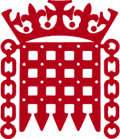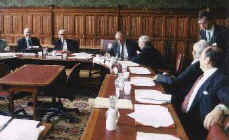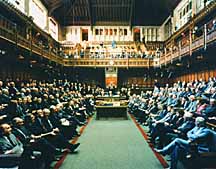
It processes and revises legislation. Bills have to go through various stages in both Houses before they receive Royal Assent and become Acts. The Lords spends about two-thirds of its time revising or initiating legislation. It acts as a check on the Government. Members question the Government orally or by written questions, they debate policy issues and scrutinise secondary legislation.
It provides a forum of independent expertise. Specialist Select Committees enable members’ wide ranging expertise to be actively used. The European Communities Committee has 6 sub-committees involving over 60 members who vet proposed European legislation. The Science and Technology Committee involves over 20 Members in examining science policy.
It acts as a final Court of Appeal. The House, through its Appellate Committee fulfills this function for the United Kingdom in civil cases and for England, Northern Ireland and Wales in criminal cases. Members include the Law Lords and the Lord Chancellor.

The Science and Technology Committee Picture of the House Of Lords

